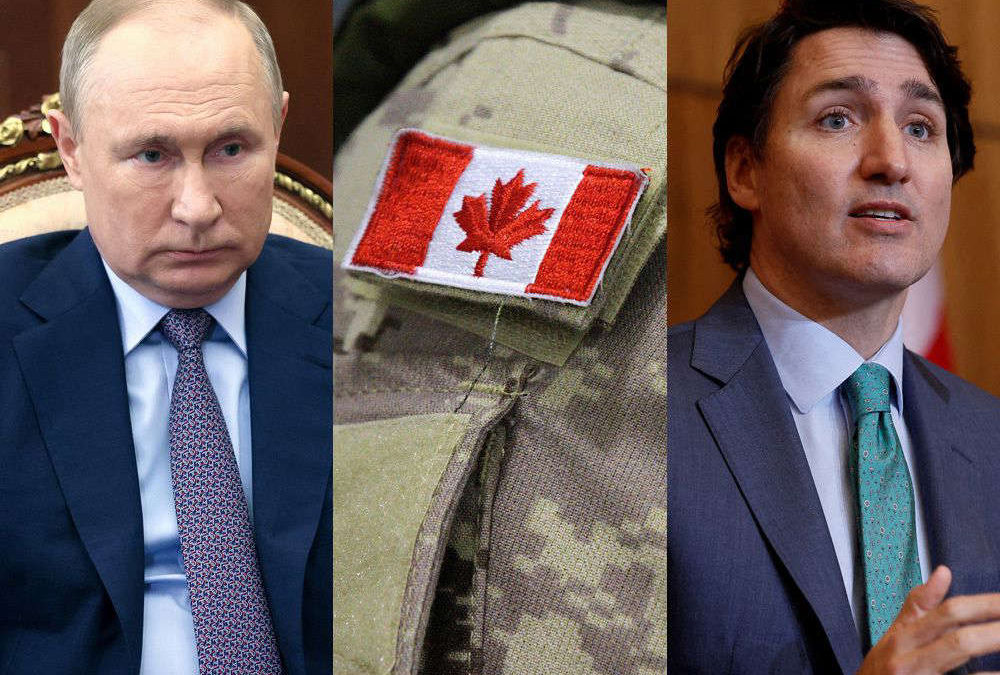Prime Minister Justin Trudeau made the announcement Friday morning, hours after top diplomats from the U.S. and Russia met in Switzerland in a bid to lower the temperature on the Ukrainian standoff.
“Russia is aiming to destabilize Ukraine, including economically. This loan will help support Ukraine’s economic resilience,” Trudeau said.
“We’re also exploring other options to provide financial and other supports. … Again, Canada calls on Russia to de-escalate and engage in meaningful dialogue.”
Furthermore, Canada has offered to provide a technical assistance grant of up to $6 million to support the implementation of the loan.
Canadian and Ukrainian officials are already meeting to discuss the potential terms of the loan and a timeline for its implementation, officials said in a news release Friday.
“We are looking to support the people of Ukraine in the challenges they’re facing against an aggressive Russia that has amassed troops at the borders, that is interfering in Ukrainian political affairs, that is using cyber-attacks and propaganda to destabilize Ukraine,” Trudeau said.
“Canada has been and will continue to be a friend and ally of Ukraine, and we will continue to be there to support them and to ensure that Ukrainian people get to determine their futures — not (Russian President) Vladimir Putin.”
With an estimated 100,000 Russian troops massed near Ukraine, many nations fear Moscow is preparing an invasion, although Russia denies that. The U.S., Canada and its allies are working to present a united front to prevent that or co-ordinate a tough response if they can’t.
Ukraine’s economy has been crushed by weeks of tensions as Russia masses troops near its borders, while talks between western nations and Moscow fail to produce breakthroughs.
The risk of conflict comes with Ukraine’s central bank already grappling with inflation that hit double digits last year on energy and food prices, and prompted five interest rate hikes in 2021.
Melanie Joly, Canadian Foreign Affairs Minister, said Thursday that Canada will join allies in imposing severe sanctions on Russian officials if the country takes further military action to compromise Ukrainian sovereignty.
Ukraine has requested military equipment and weapons from Canada, but Ottawa has yet to respond to those requests. Trudeau said his government is looking at several options that were based on information Joly gathered during her European trip this week.
The loan was one of Ukraine’s top requests, he added.
The Ukrainian government has been clear that “having additional financial resources to shore up their economy will be extremely important in terms of reassuring the Ukrainian people, and standing strong against these Russian destabilizations,” he said.
“There is, of course, more we are looking to do, and we’ll continue to work with them on that.”
Ukraine’s Prime Minister, Denys Shmyhal, tweeted Friday he was “grateful” for Canada’s support.
“Our two nations share the view that the European security is impossible without Ukraine’s security,” he said.
In addition to the loan, Canada has sent a small group of special forces operators to Ukraine to advise the government in Kyiv and help plan an evacuation of Canadian diplomatic staff in the event of an invasion.
It has also committed roughly $700 million in support of the Ukrainian government since Russia’s annexation of Crimea in 2014. For years, Canada has sent rotations of 200 Canadian Armed Forces members to help train Ukrainian security forces under Operation UNIFIER.
Putin has claimed the increased military presence along the Russia-Ukraine border is in response to provocations from the West.
On Wednesday, U.S. President Joe Biden said that he expects Putin to invade Ukraine, but that Russia would pay a “dear price” in lives lost and a possible cutoff from the global banking system if it does.
Also on Friday, U.S. Secretary of State Antony Blinken and Russian Foreign Minister Sergey Lavrov met in Geneva at what the American said was a “critical moment.”
Blinken said Lavrov repeated Russia’s insistence that it doesn’t plan to invade Ukraine, but stressed that the U.S. and its allies were not convinced.
“We didn’t expect any major breakthroughs to happen today, but I believe we are now on a clearer path to understanding each other’s positions,” Blinken told reporters after the meeting Friday.
Lavrov, meanwhile, told reporters he couldn’t say whether diplomacy was on the “right track or not.”
“We will understand that when we receive the U.S. written response to all of our proposals,” he said.
Moscow wants the NATO alliance to promise that Ukraine — a former Soviet republic — will never be allowed to join. It also wants the allies to remove troops and military equipment from parts of eastern Europe.
The U.S., Canada and its NATO allies have rejected those demands and said Putin knows they are nonstarters. However, they are open to less dramatic moves.
— with files from Reuters and The Associated Press


